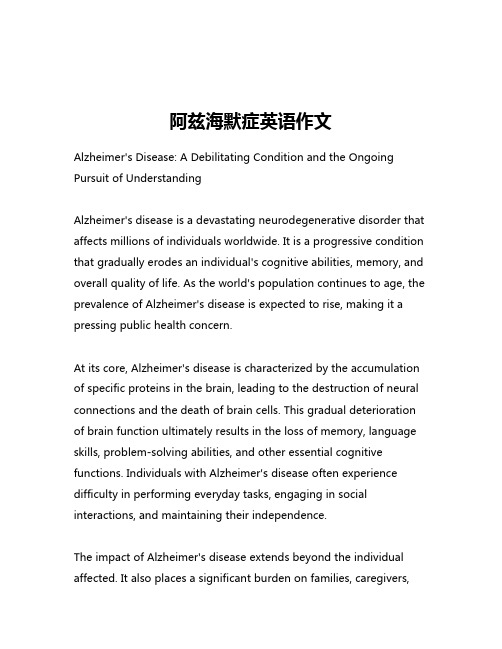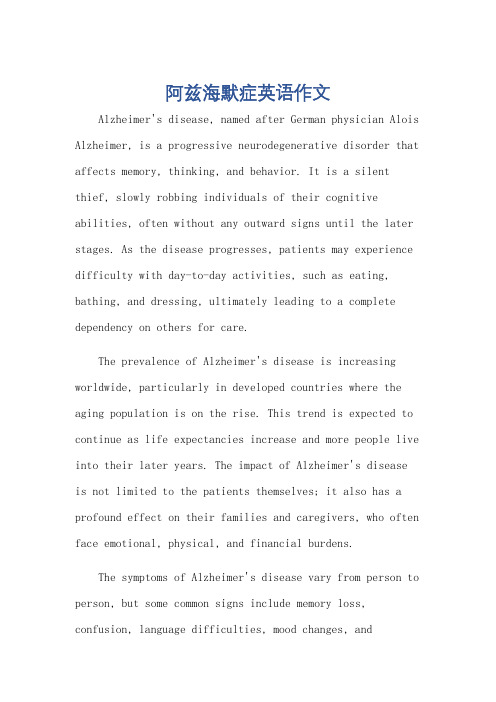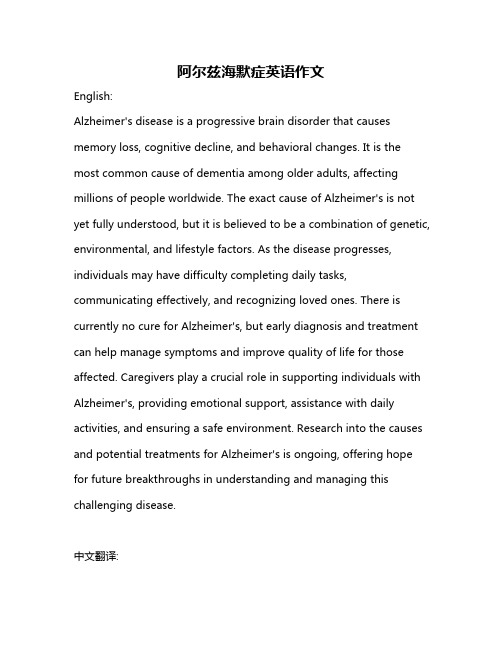阿尔茨海默症英语介绍
阿兹海默症英语作文

阿兹海默症英语作文Alzheimer's Disease: A Debilitating Condition and the Ongoing Pursuit of UnderstandingAlzheimer's disease is a devastating neurodegenerative disorder that affects millions of individuals worldwide. It is a progressive condition that gradually erodes an individual's cognitive abilities, memory, and overall quality of life. As the world's population continues to age, the prevalence of Alzheimer's disease is expected to rise, making it a pressing public health concern.At its core, Alzheimer's disease is characterized by the accumulation of specific proteins in the brain, leading to the destruction of neural connections and the death of brain cells. This gradual deterioration of brain function ultimately results in the loss of memory, language skills, problem-solving abilities, and other essential cognitive functions. Individuals with Alzheimer's disease often experience difficulty in performing everyday tasks, engaging in social interactions, and maintaining their independence.The impact of Alzheimer's disease extends beyond the individual affected. It also places a significant burden on families, caregivers,and the healthcare system as a whole. Caring for a loved one with Alzheimer's can be emotionally, physically, and financially taxing, as the disease progresses and the need for specialized care increases. The emotional toll on family members and caregivers can be immense, as they witness the gradual decline of their loved one and struggle to provide the necessary support.Despite the profound impact of Alzheimer's disease, the scientific community has made significant strides in understanding the underlying mechanisms of the condition. Extensive research has been conducted to unravel the complex interplay of genetic, environmental, and lifestyle factors that contribute to the development and progression of Alzheimer's disease. This research has led to advancements in early detection, diagnostic techniques, and the development of potential therapeutic interventions.One of the key areas of focus in Alzheimer's research is the identification of biomarkers – biological indicators that can help detect the disease in its early stages. By identifying these biomarkers, researchers aim to develop more accurate diagnostic tools that can facilitate earlier intervention and potentially slow the progression of the disease. Additionally, researchers are exploring various pharmacological and non-pharmacological approaches to manage the symptoms of Alzheimer's disease and improve the quality of life for those affected.Pharmacological interventions, such as the use of cholinesterase inhibitors and memantine, have been approved for the treatment of Alzheimer's disease. These medications aim to address the underlying neurochemical imbalances that contribute to the cognitive decline associated with the condition. While these treatments can provide temporary relief and potentially slow the progression of the disease, they do not offer a cure.Alongside pharmacological approaches, researchers are also investigating non-pharmacological interventions, such as cognitive stimulation therapy, physical exercise, and lifestyle modifications. These interventions focus on enhancing cognitive function, promoting brain plasticity, and addressing the overall well-being of individuals with Alzheimer's disease. By adopting a holistic approach to care, healthcare professionals and researchers aim to empower patients and their families to maintain the highest possible quality of life.Furthermore, the scientific community is actively engaged in exploring novel therapeutic strategies, including the development of disease-modifying drugs, immunotherapies, and stem cell-based therapies. These innovative approaches hold the potential to target the underlying pathological processes of Alzheimer's disease more effectively and potentially delay or even prevent the onset of thecondition.As the search for a cure continues, it is essential to recognize the importance of providing comprehensive care and support for individuals with Alzheimer's disease and their families. This includes the development of specialized care facilities, the implementation of caregiver support programs, and the promotion of public awareness and education about the disease.In conclusion, Alzheimer's disease is a complex and debilitating condition that poses significant challenges to individuals, families, and healthcare systems worldwide. However, the ongoing efforts of researchers, healthcare professionals, and the broader community have led to significant advancements in our understanding of the disease and the development of promising interventions. By continuing to invest in research, improving care and support systems, and fostering public awareness, we can strive to alleviate the burden of Alzheimer's disease and provide hope for those affected by this devastating condition.。
阿尔茨海默症英语介绍课件

More women than men 7:5~4:6
Disease for up to 10-20 years
PPT学习交流
9
Degradation of memory and cognition
PPT学W习交il流liam Utermohlen的自画像
10
Degradation of memory and cognition
PPT学习交流
11
Degradation of memory and cognition
• "the effects of Alzheimer's disease on the right parietal lobe of the brain are particularly severe, which directly affects the abilit of the brain to visualize and develop the ability to draw picture the brain."said Dr. Bruce Miller, a neurologist.
• His work became more abstract, may be the parietal function damaged, causing blindness.
• What kind of changes have occurred in the brains of patients w
03 Pathogeny&Treatment
PPT学习交流
ቤተ መጻሕፍቲ ባይዱ
04 Other
3
1 brief introduction
PPT学习交流
阿尔茨海默症英语介绍演示PPT

➢ What kind of changes have occurred in the brains of patients with dementia, which is not yet fully understood by the world 's academia.
➢William insisted the 5 New Year paintings self portrait, until completely forgotten how to draw. From the use of skilled drawing, dark portrayal of vivid features, to the same color, shape deformation, self portrait became more and more abstract (pictured above).
Nerve cells die in areas of the brain that are vital to memory and other mental abilities.
7
2 Clinical manifestation
8
Clinical manifestation
Mild dementia Moderate dementia Severe dementia
临床症Clinical symptom
➢记忆障碍dysmnesia ➢失语aphasia ➢失认agnosia ➢执行功能障碍executive dysfunction ➢痴呆dementia
阿尔茨海默症英语介绍 ppt课件

Beta amyloid (blue curve) and Tau protein (orange curve) Research papers published in recent 30 years
Treatment
increase the concentration of acetylcholine (Ach) in the brain
9
Degradation of memory and cognition
William Utermohlen的自画像
Degtion
William Utermohlen is an American artist, in 1995 he was diagnosed with Alzheimer's disease. Since then, he has decided to take advantage of the limited time available to retain memory and better understand himself through self portraits.
Degradation of memory and cognition
"the effects of Alzheimer's disease on the right parietal lobe of the brain are particularly severe, which directly affects the ability of the brain to visualize and develop the ability to draw pictures of the brain."said Dr. Bruce Miller, a neurologist.
阿兹海默症英语作文

阿兹海默症英语作文Alzheimer's disease, named after German physician Alois Alzheimer, is a progressive neurodegenerative disorder that affects memory, thinking, and behavior. It is a silent thief, slowly robbing individuals of their cognitive abilities, often without any outward signs until the later stages. As the disease progresses, patients may experience difficulty with day-to-day activities, such as eating, bathing, and dressing, ultimately leading to a complete dependency on others for care.The prevalence of Alzheimer's disease is increasing worldwide, particularly in developed countries where the aging population is on the rise. This trend is expected to continue as life expectancies increase and more people live into their later years. The impact of Alzheimer's disease is not limited to the patients themselves; it also has a profound effect on their families and caregivers, who often face emotional, physical, and financial burdens.The symptoms of Alzheimer's disease vary from person to person, but some common signs include memory loss, confusion, language difficulties, mood changes, andimpaired judgment. As the disease progresses, these symptoms become more severe, and patients may experience delusions, hallucinations, and even loss of physical functions. There is currently no cure for Alzheimer's disease, and treatment options are limited to managing symptoms and improving quality of life.The cause of Alzheimer's disease is still not fully understood, but research suggests that it may be caused by a combination of genetic, environmental, and lifestyle factors. While genetics play a role in determining a person's risk of developing the disease, environmental factors such as diet, exercise, and social interaction may also influence its development. Therefore, preventing Alzheimer's disease is a complex task that requires a multifaceted approach.In terms of prevention, maintaining a healthy lifestyle is crucial. This includes eating a balanced diet, staying physically active, and engaging in social activities that stimulate the brain. Additionally, maintaining cognitive fitness through activities like reading, writing, andlearning new skills can help delay the onset of Alzheimer's disease.For those who are already affected by Alzheimer's disease, support and care are essential. This includes providing a safe and secure environment, assisting with daily activities, and offering emotional support. Caregivers should also seek respite care and support groups to help them cope with the stress and burden of caring for a person with Alzheimer's disease.In conclusion, Alzheimer's disease is a growing challenge in modern society. Its impact is felt not only by the patients themselves but also by their families and caregivers. By understanding the disease, its symptoms, and its causes, we can take steps to prevent its development and provide better support and care for those who are affected. While there is currently no cure for Alzheimer's disease, through research and innovation, we hope to find better ways to manage its symptoms and improve the quality of life for those who are living with it.**阿尔茨海默症:现代社会日益严峻的挑战**阿尔茨海默症,以德国医生阿洛伊斯·阿尔茨海默命名,是一种进行性神经退行性疾病,影响记忆、思维和行为。
阿尔茨海默症英语介绍

➢ 记忆障碍dysmnesia ➢ 失语aphasia ➢ 失认agnosia ➢ 执行功能障碍executive dysfunction ➢ 痴呆dementia
The disease usually begins after age 60, and risk goes up with age.
Two types
• Alzheimer's disease(AD) <65 years old
• senile dementia(SDAT) ≥65 years old
Name
In 1906,AD is named by Dr. Alois Alzheimer, a German doctor.
Memories of Tomorrow
The Notebook
Thank you
Degradation of memory and cognition
His work became more abstract, may be the parietal function damaged, causing blindness.
Thank you, my friends.
Clinical manifestation
alzheimersdiseaseadprogressiveneurodegenerativedisorder临床症状clinicalsymptom记忆障碍dysmnesia失语aphasia失认agnosia执行功能障碍executivedysfunction痴呆dementiadiseaseusuallybeginsafterage60riskgoesuptwotypes?alzheimersdiseasead65yearsold?seniledementiasdat65yearsolddraloisalzheimergermandoctor
阿兹海默症英语作文

阿兹海默症英语作文Title: Understanding Alzheimer's Disease.Alzheimer's disease is a progressive neurological disorder that affects the brain, leading to memory loss, cognitive decline, and changes in behavior. It is the most common form of dementia, affecting millions of people worldwide. As a caregiver, it is important to understand the challenges faced by individuals with Alzheimer's disease and provide them with the support and care they need.One of the key symptoms of Alzheimer's disease is memory loss, which can range from forgetting recent events to not recognizing close family members. This can be distressing for both the individual with Alzheimer's and their loved ones. As a caregiver, it is important to be patient and supportive, helping the person with Alzheimer's navigate their daily life with compassion and understanding.In addition to memory loss, individuals with Alzheimer's may also experience changes in behavior, such as confusion, agitation, and wandering. It is important to create a safe and supportive environment for them, ensuringthat they are not at risk of harm. Establishing routines and providing reassurance can help reduce anxiety and improve the quality of life for individuals with Alzheimer's.Furthermore, caregivers should encourage social interactions and engagement to help stimulate cognitive function and maintain a sense of connection with others. Activities such as music therapy, art therapy, and reminiscence therapy can be beneficial in improving mood and cognitive abilities in individuals with Alzheimer's.In conclusion, Alzheimer's disease presents unique challenges for both individuals with the condition and their caregivers. By understanding the symptoms and providing compassionate care and support, caregivers can help improve the quality of life for those affected by Alzheimer's disease.中文翻译:阿兹海默症。
阿尔兹海默症英语作文

阿尔兹海默症英语作文English:Alzheimer's disease is a progressive brain disorder that causes memory loss, cognitive decline, and behavioral changes. It is the most common cause of dementia among older adults, affecting millions of people worldwide. The exact cause of Alzheimer's is not yet fully understood, but it is believed to be a combination of genetic, environmental, and lifestyle factors. As the disease progresses, individuals may have difficulty completing daily tasks, communicating effectively, and recognizing loved ones. There is currently no cure for Alzheimer's, but early diagnosis and treatment can help manage symptoms and improve quality of life for those affected. Caregivers play a crucial role in supporting individuals with Alzheimer's, providing emotional support, assistance with daily activities, and ensuring a safe environment. Research into the causes and potential treatments for Alzheimer's is ongoing, offering hope for future breakthroughs in understanding and managing this challenging disease.中文翻译:阿尔茨海默病是一种渐进性的大脑障碍,导致记忆丧失、认知下降和行为变化。
- 1、下载文档前请自行甄别文档内容的完整性,平台不提供额外的编辑、内容补充、找答案等附加服务。
- 2、"仅部分预览"的文档,不可在线预览部分如存在完整性等问题,可反馈申请退款(可完整预览的文档不适用该条件!)。
- 3、如文档侵犯您的权益,请联系客服反馈,我们会尽快为您处理(人工客服工作时间:9:00-18:30)。
2
Clinical manifestation
Clinical manifestation
Mild dementia Moderate dementia Severe dementia
Ⅰ期
1-3 years
Ⅱ期
Ⅲ期
death
2-10 years
7:5~4:6
8-12 years
More women than men
3
Pathogeny&othesis of AD
Pathogeny
vs
Abnormal amyloid beta cell deposition in neurons Abnormal phosphorylation of tau protein
His work became more abstract, may be the parietal function damaged, causing blindness. What kind of changes have occurred in the brains of patients with dementia, which is not yet fully understood by the world 's academia.
临床症状Clinical symptom 记忆障碍dysmnesia 失语aphasia 失认agnosia 执行功能障碍executive dysfunction 痴呆dementia
The disease usually begins after age 60, and risk goes up with age.
Catalog
01
brief introduction
02
Clinical manifestation
03
Pathogeny & Treatment
04
Other
1
brief introduction
What?
Alzheimer's disease (AD) is a progressive neurodegenerative disorder .
Two types
• Alzheimer's disease(AD) <65 years old • senile dementia(SDAT) ≥65 years old
Name
In 1906,AD is named by Dr. Alois Alzheimer, a German doctor. Dr. Alzheimer noticed changes in the brain tissue of a woman who had died of an unusual mental illness. He found abnormal clumps. Scientists also have found other brain changes in people with AD. Nerve cells die in areas of the brain that are vital to memory and other mental abilities.
4
Other
Film
Still Alice
The film tells the story of Alice Howland in seriously AD but still strong and brave .
The film won the eightyseventh Oscar award
William insisted the 5 New Year paintings self portrait, until completely forgotten how to draw. From the use of skilled drawing, dark portrayal of vivid features, to the same color, shape deformation, self portrait became more and more abstract (pictured above).
Degradation of memory and cognition
"the effects of Alzheimer's disease on the right parietal lobe of the brain are particularly severe, which directly affects the ability of the brain to visualize and develop the ability to draw pictures of the brain."said Dr. Bruce Miller, a neurologist.
promoting survival of cholinergic neurons in the brain or improving their nerve conduction function
reducing the production or promoting degradation of beta amyloid
Memories of Tomorrow
The Notebook
Thank you
Disease for up to 10-20 years
Degradation of memory and cognition
William Utermohlen的自画像
Degradation of memory and cognition
William Utermohlen is an American artist, in 1995 he was diagnosed with Alzheimer's disease. Since then, he has decided to take advantage of the limited time available to retain memory and better understand himself through self portraits.
Alzheimer ’s Disease
阿尔茨海默症
Ronald Wilson Reagan 罗纳德·威尔逊·里根
第40任(第49-50届)美国总统 president “I know I'm on my way to the twilight. I know there's always a bright dawn ahead of the United states. Thank you, my friends. May God bless you forever.”
Beta amyloid (blue curve) and Tau protein (orange curve) Research papers published in recent 30 years
Treatment
increase the concentration of acetylcholine (Ach) in the brain
